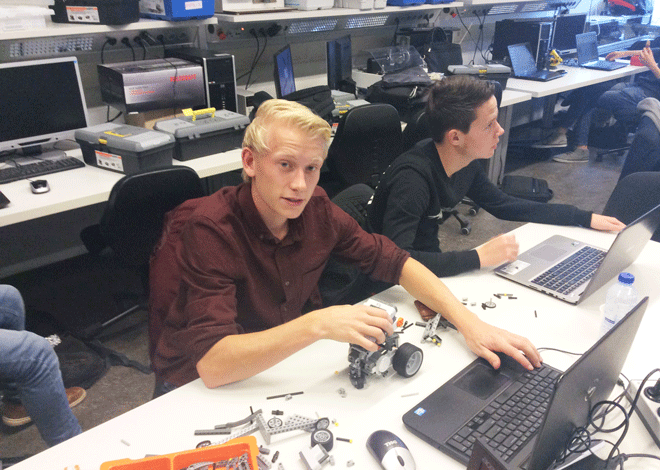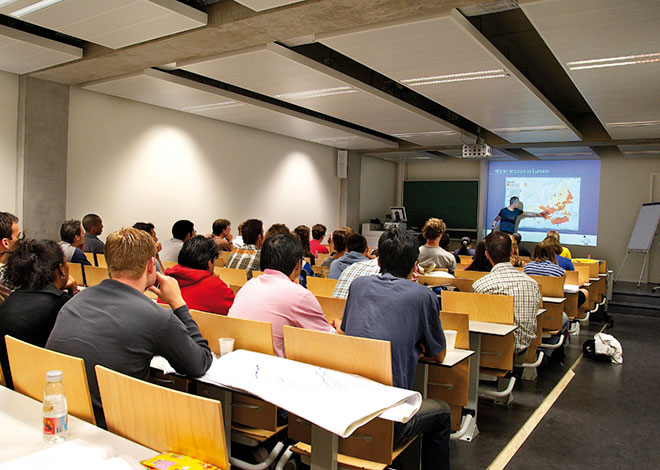Selection process and lecturer, study matching
The study programme selection process and the lecturer? Study matching? What are those and what do they have to do with each other?
Before your son or daughter begins their studies, they will take a study choice check. The study choice check or study matching is the last step in the selection process. This is not a selection but a last check for the student. Your son or daughter can perform a final check on whether a degree programme is the right fit.

Study choice check – what is it?
Sometimes, the student fills in an online survey and other times, the lecturer or study development counsellor holds an interview with the student—there may even be a test lecture. The degree programme may determine how “strong” the study matching is on its own. There are many differences: all degree programmes use their own approach here.
Study matching is not a selection, it is intended to benefit the student, but also helps the degree programme form an opinion. Do the lecturers feel that the prospective student can complete the degree programme successfully?
Register in time
It is important to register in time, so the student has lots of time to think about his choice. Study success has a lot to do with thinking this over and over.
The study choice check is not something that the student has to “pass,” it is the absolute last test before the student determines whether their programme choice is the right one.
I would recommend listening well to the recommendation of the lecturer or the degree programme. On average, around 30% of students dropout or withdraw during the first year. It’s disappointing for the student, but certainly for the parents, too. Feike Klomp, a father, experienced this disappointment when his son dropped out during his first year of study. Read his experiences as a father.
Feike: The study choice and my son’s gap year
Last year, my 18-year-old son Ivo quit his Civil Engineering study programme at a university of applied sciences after just three weeks. It was not to his liking—he felt uneasy and called it quits.
What should I do now?
I “travelled” with my son to see the various options out there and to choose a new study programme. The gap year that followed made an enormous difference for him, enormous. Ivo has changed, he is more mature. His outlook on life has changed. He is stronger now and has found his positive flow. He visited Open Days, got his driving licence, and found a job to fill the time between now and August.
I’m continuing to “travel.” I met various professionals who play a role in the choice of a study programme and the study success of my son. At the first “stop”, I spoke with a dean and my nextmeetings were with a school manager and a work placement supervisor. They provided a lot of interesting information.
Feike Klomp, a father “travelling” with his son in “study choice land.”
Feike: My son has changed
In a few months’ time, I saw my somewhat unsure, “stubborn” son change into a happy, hard-working boy that clearly enjoys his life. And now? He went back to the same university of applied sciences and started a degree programme in Industrial Product Design. Now he has been “on his way” for a few weeks and I really can’t say anything else about it: it makes him happy. He seems to like the degree programme, quickly began socialising with the other students, dives into assignments, and no longer goes to school reluctantly. Of course, now it is a question of just keeping with it. However, the first few weeks have been good. This actually started with the study choice check or study matching. So that will be the next stop in my travels.
The study programme selection process and the lecturer
This time, I will be speaking with Theo Miltenburg about the study programme selection process and the lecture, and then specifically the lecturer in the position of the professional who supervises the study choice check. Theo Miltenburg is a lecturer/researcher (mechatronics degree programme) at Saxion University of Applied Sciences in Enschede. He tells us about his experiences as a study development counsellor and explains that he puts a lot of work into its extensive intake programme with the motto “well begun is half done.”
Study development counsellor at Saxion: Theo Miltenburg:
“Our point of departure for the preliminary registrations is: does the student match with the degree programme?
Imagine choosing a specific technical degree programme, such as our Mechatronics programme—it’s important that your skills line up with the direction you have chosen. Do you feel an affinity with the study programme? The intake (study choice check) at Saxion consists of two parts. An extensive intake interview and completing an assignment. This afternoon can yield a complete picture that leads to three conclusions.
Three options: admitted, needs work, or better not
“We see that the student is more than equipped. That means they can start. You are welcome to enrol in the programme.
The second option: We give a positive recommendation, however there are areas of concern that the student needs to take into account. There may be tutoring and/or support required.
The third option: The conclusion may also be that the prospective student is not suitable for the study programme and we recommend that they not choose this area of focus. Or you can continue with it and prove us wrong.” The time that you register is also decisive when it comes to whether you can participate in this study programme at Saxion. If someone has registered by at least 1 May, then an unsatisfactory match recommendation has no consequences for your choice of study. However, it is reasonable to reconsider your choice. An adviser from our StudieSuccesCentrum (Study success centre) can help you with this. Of course, we don’t let people ‘drift’ or leave them to chance.”
Help in choosing a study programme
“In any case, Saxion puts a lot of energy into providing assistance with choosing a study programme”, emphasises Theo in his role as lecturer and study development counsellor looking at the complex study selection process. You can try out studying with us, from participating in a Prospective Students’ Day to study try-outs. You can also contact our information centre and/or the student information desk. In the past, I looked for the right degree programme myself as well and ultimately found the match, so I can sympathise with these young people. It is important that you choose a degree programme that suits you and makes you happy. In the end, that is better for the school as well. Without a doubt, it opens the doors to a wonderful future for you. I think it’s great to play a role in this: making students, and in turn, parents, happy.”
Feike: Lecturers are important
As a father, I found this conversation very interesting. In my travels, I learn more and more about how many people play a role in study choice and study success. The study selection process and the lecturer at the university—of course, it’s important how the university looks at the match. Feike Klomp

Study match or study choice check—the final step
If a prospective student chooses a degree programme that does not have an enrolment restriction, i.e. a degree programme which, in principle, will always admit you if you have the proper prior education. It is not a selection process. Then they must register before 15 May. If so, they will always be admitted.
However, the student will still receive a final recommendation from the degree programme. Sometimes, that consists of the extensive intake process described by study development counsellor Theo Miltenburg. There are also degree programmes where completing an online survey is sufficient. Does your son or daughter feel like that is not enough and do they still want to have that final interview? A student has a right to that interview.
Listen well
I recommend that students listen well to the recommendation. It is not a seletion, it is a help. If there are doubts on the part of the degree programme about the study choice, think it over thoroughly. The study choice check is the last step in the study selection process and the lecturer for the higher education programme presents their opinion of the choice for a reason—this opinion is based on years of experience.
If a student registers after 15 May, the degree programme can reject the student.
The minister also intends to have this study choice check expanded in the future in order to prevent an unnecessary dropout rate in the first year. The study selection process and the lecturer for the higher education programme will coordinate more closely in the future. Are there other institutions that can tell us something about their study match / study choice check?

